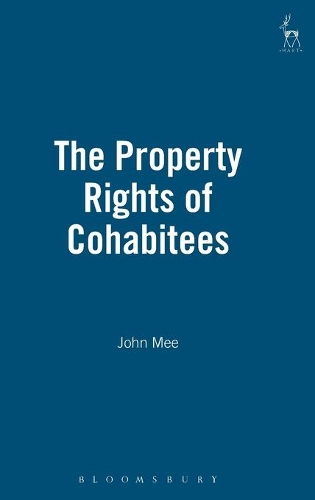
The Property Rights of Cohabitees
(Hardback)
Publishing Details
The Property Rights of Cohabitees
By (Author) John Mee
Bloomsbury Publishing PLC
Hart Publishing
1st April 1999
United Kingdom
Classifications
Tertiary Education
Non Fiction
Family law: marriage, separation and divorce
346.410166
Physical Properties
Hardback
384
Width 156mm, Height 234mm, Spine 30mm
Description
Although disputes upon the termination of a marriage are usually resolved in accordance with a legislatively determined scheme, similar disputes between unmarried cohabitees (except in certain Australian jurisdictions) have to be determined on the basis of rules developed by the courts. Much of the difficulty surrounding the area is attributable to the fact that it straddles a number of the traditional legal compartments, falling somewhere between Equity, Property, Family, Contract and Restitution. This book seeks to break down some of the barriers which in the past have hindered a full understanding of the issues involved. It begins with an introductory chapter which places heterosexual and homosexual cohabitation in its general social and legal context. The focus then turns to a doctrinal analysis of equity's response in five common law jurisdictions. Part of the problem has been that the special circumstances of the family situation have created an impulse to "cheat" on the strict legal rules in order to do justice in an individual case. Unfortunately, there has been no consensus as to which particular rule to bend, with the result that a wide variety of competing doctrines have arisen. The book makes a determined effort to isolate each strand of the doctrinal tangle and to trace it back to its source. To this end, it considers developments in the established doctrines of resulting trust and estoppel, before moving on to consider, in turn, the English "common intention" trust; the modified resulting trust analysis favoured in Ireland; Lord Denning's abortive "constructive trust of a new model"; the Canadian unjust enrichment approach; the Australian "unconscionability" doctrine; and, finally, New Zealand's "reasonable expectations" model. A comparative approach is taken throughout the book, culminating in a concluding chapter which draws together a number of themes which recur across the various doctrinal approaches.
Reviews
...an invaluable resource, charting the historical development of the approaches taken in each jurisdiction.The book is well written and presented, with extremely useful footnoting and a comprehensive index. In the opinion of the reviewer, Mee's book is informative and easy to read, and it should attract a readership beyond the guild of property lawyers! -- John Stevens * Restitution Law Review *
Mees book is highly readable, intelligently argued and contains food for thought on both theoretical and practical levels. -- Alison Dunn * Trust Law International *
Author Bio
John Mee is a Lecturer in Law at University College Cork, Eire.
